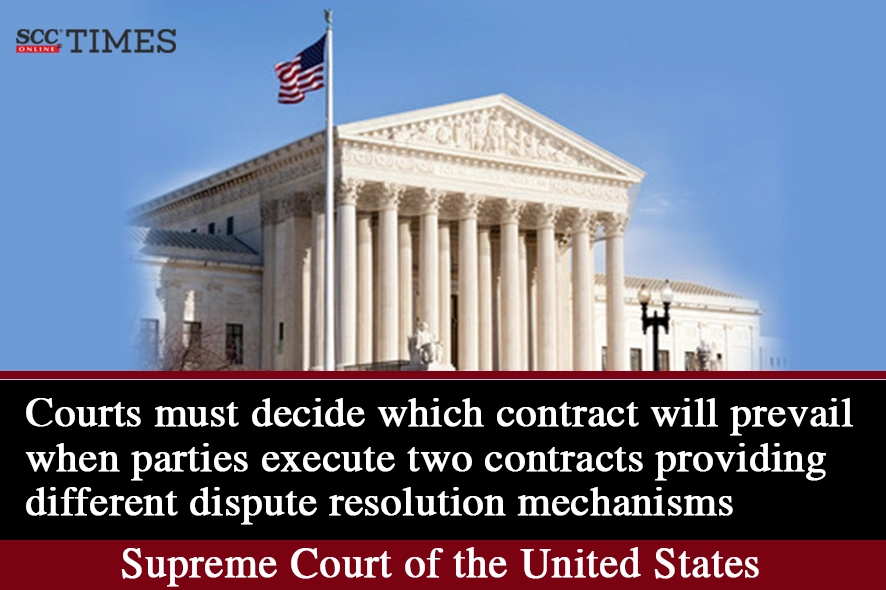Supreme Court of the United States (SCOTUS): In a writ of certiorari instituted by the appellant against the decision of the Court of Appeals for the Ninth Circuit (“Ninth Circuit”), involving a conflict between two contracts executed by Coinbase, Inc., operator of a cryptocurrency exchange platform, and the respondents, who used Coinbase; the question revolved around two different modes of dispute resolution mechanisms – one providing for court’s jurisdiction, and another for arbitration. The Bench comprising of Ketanji Brown Jackson* and Neil Gorsuch, JJ, answering the question posed before it, held that a Court should decide whether one contract is superseded by the other, in case two contracts with differing dispute resolution provisions have been executed between the parties. Neil Gorsuch J. issued a concurring opinion.
Background
The appellant (“Coinbase”) is a cryptocurrency exchange platform operator, and the respondents (“Users”) were users of the said platform. The dispute between the two was concerning two contracts executed between them.
The first contract (“User Agreement”) contained an arbitration provision with a delegation clause, according to which an arbitrator was to decide all the disputes arising out of the contract, including the arbitrability of the dispute. The second contract (“Official Rules”) contained a forum selection clause, providing that California courts shall have the sole jurisdiction on any disputes regarding promotional sweepstakes.
The Users filed a class action in the District Court, alleging the violation of multiple Californian laws-false advertising law, unfair competition law, Consumer Legal Remedies Act. Coinbase contended the dispute was subject to arbitration, based on the User Agreement.
The District Court denied Coinbase’s contention, stating that the User Agreement conflicted with the Official Rules, and under Californian contract law, Official Rules superseded the User Agreement. The Ninth Circuit affirmed the District Court’s decision. The matter was heard by the Supreme Court, to address the issue as under.
Issue
When two such contracts exist, who decides the arbitrability of a contract-related dispute between the parties- an arbitrator or the Court?
Court’s decision
The Court stated that arbitration is a matter of contract and consent, and that they maintained the view that disputes are subject to arbitration only when the parties have agreed to arbitrate the disputes.
However, the Court also stated that a party that has not agreed to arbitrate will normally have a right to the court’s decision about the merits of a dispute.
Hence, courts should not assume that the parties have agreed to arbitrate arbitrability unless the same has been clearly and unmistakably evidenced. Therefore, the court must determine whether a valid arbitration agreement exists before it refers a dispute to an arbitrator.
Jackson J. responded to some contention raised by Coinbase, which were:
-
An arbitration provision is severable from the rest of the contract, unless the challenge is to the arbitration provision [as per the Federal Arbitration Act (“FAA”)].
The Court responded, stating that the severability principle applicable to arbitration provisions establishes the need for challenging the arbitration provision directly and not only the entire contract. A Court must address the issue when equal challenge is made to the arbitration provision and the entire contract.
-
The superseding effect of the Official Rules over the User Agreement was wrong.
The Court’s response was that they had admitted this case to decide whether a court or an arbitrator shall decide where two contractual provisions provide for differing dispute resolution methods, under the FAA. The Court refused to address this contention, stating that this was out of the scope of question before it in the instant matter.
-
The Court’s approach is chaotic because it will facilitate challenges to delegation clauses.
The response of the Court was that where parties have agreed to two contracts containing differing dispute resolution methods, a court must decide which contract governs the same. The indecision of the same shall result in elevating a delegation provision over other forms of contract.
The Court concluded that a court should decide whether the User Agreement is superseded by the Official Rules, and not an arbitrator.
[Coinbase Inc v. Suski, Certiorari to the United States Court of Appeals for the Ninth Circuit No. 23-3, decided 23-05-2024]
*Opinion of the Court by: Justice Ketanji Brown Jackson







